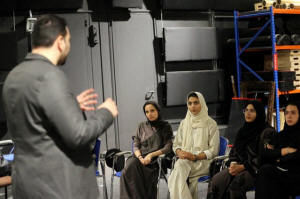|
Major plot twist for students at Saudi
Arabia's first cinema school
 Send a link to a friend
Send a link to a friend
 [March 14, 2018]
JEDDAH (Reuters) - Student Sama
Kinsara adjusts her camera at Saudi Arabia’s only cinema school, her
dream of seeing her work on the big screen coming into focus after the
lifting of the country's 35-year ban on cinema. [March 14, 2018]
JEDDAH (Reuters) - Student Sama
Kinsara adjusts her camera at Saudi Arabia’s only cinema school, her
dream of seeing her work on the big screen coming into focus after the
lifting of the country's 35-year ban on cinema.
"Everything is about to change," the first-year student of "visual and
digital production" at Effat University in Jeddah told Reuters.
Her course is to be renamed "cinematic arts", dropping the deceptive
title employed originally to help stay under the radar of religious
police and local communities opposed to the idea of men teaching women
how to make movies.
Kinsara and her classmates on the four-year, women-only course have been
able to film outside the university grounds for the first time.
"A girl carrying a camera and shooting in the streets is pushing
boundaries," said Mohamed Ghazala, head of Effat's Visual and Digital
Production Department, which began the course in 2013.

The changes follow the lifting of restrictions by reform-minded Crown
Prince Mohammed bin Salman over the last year.
Authorities hope that by opening 300 cinemas and building a film
industry, more than $24 billion can be added to the economy and 30,000
jobs created.
Cinema is one of several new avenues for Saudi women, who can now attend
soccer matches, take part in sport, and in a few months will be allowed
to drive cars.
[to top of second column]
|

Saudi women study film making at a university in Jeddah, Saudi
Arabia March 7, 2018. Picture taken March 7, 2018. REUTERS/Yasser
Bakhsh

The deeply conservative kingdom is still one of most restrictive
countries for women in the world, with a guardianship system
requiring women to have a male relative’s approval for important
decisions.
For film student Qurratulain Waheb, the chance to get off the
university campus and film with her classmates is welcomed.
"Before, there was a problem if we had a camera in the malls, we
were not allowed to enter the malls but things are getting smoother
now when we have access," said
"When we have permissions it gets easier, it gets better and people
are more accepting. They want to see what we're doing."
(Reporting by Emily Wither; Editing by Patrick Johnston and Andrew
Roche)
[© 2018 Thomson Reuters. All rights
reserved.]
Copyright 2018 Reuters. All rights reserved. This material may not be published,
broadcast, rewritten or redistributed.
Thompson Reuters is solely responsible for this content.
 |